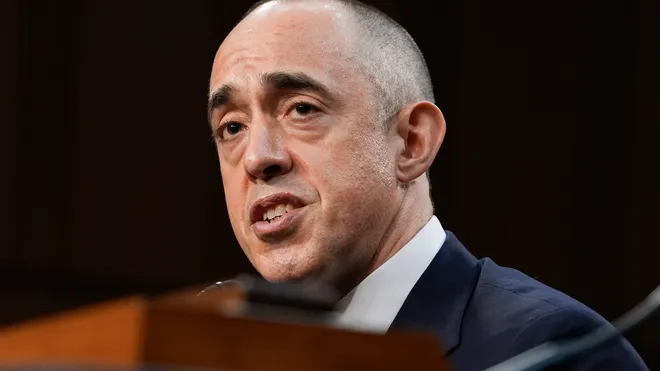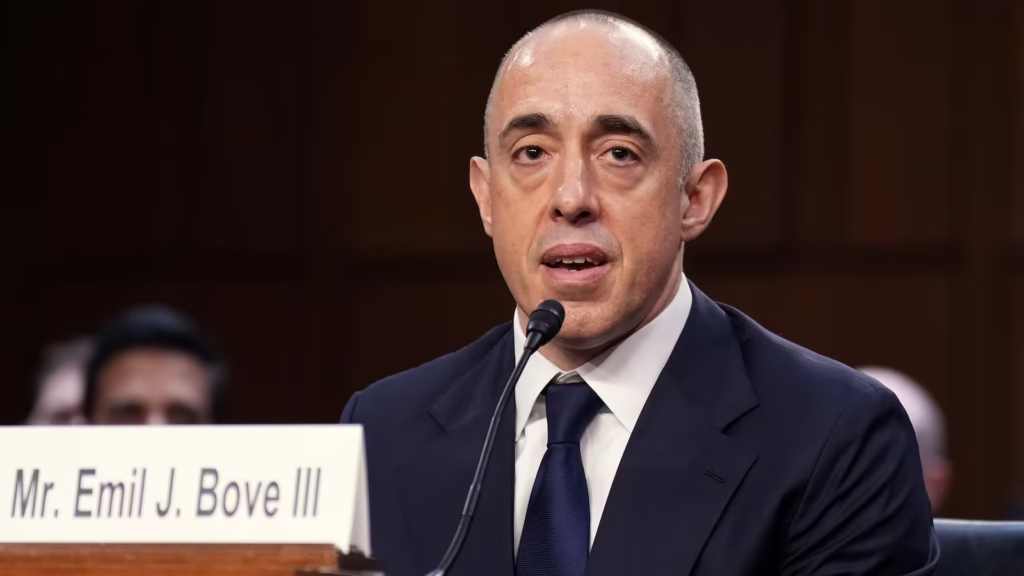Trump Court Pick Emil Bove Sparks Chaos
The nomination of Trump court pick Emil Bove has ignited political chaos in Washington. Tensions boiled over this week as Senate Democrats staged a dramatic walkout during a key vote pushed forward by Senate Republicans. The vote aimed to advance the nomination of Emil Bove, a former federal prosecutor and Donald Trump’s pick for a lifetime judicial seat on the Second Circuit Court of Appeals.
This latest clash highlights the deepening divide between Democrats and Republicans over federal court appointments — a conflict that has grown even more intense as the 2024 election season heats up. Democrats claim the process is being rushed and lacks transparency, while Republicans argue they are fulfilling their constitutional duties.
Let’s break down what happened, why this nomination is so controversial, and what it means for the future of America’s judiciary.
Who Is Emil Bove?
Emil Bove is no stranger to high-stakes legal battles. A seasoned federal prosecutor and former co-chief of the terrorism and international narcotics unit in the Southern District of New York, Bove has built a reputation for being tough, methodical, and politically aligned with conservative values.
He was closely involved in several high-profile cases, including terrorism prosecutions and financial crimes. His legal résumé is impressive — but it’s his close ties to former President Donald Trump and conservative legal circles that have raised eyebrows among Democrats.
While supporters call him a dedicated public servant, critics worry that his legal philosophy could lean too far to the right, especially on civil liberties, immigration, and law enforcement oversight.
Why Democrats Stormed Out
The walkout by Democrats came during a meeting of the Senate Judiciary Committee. Republican senators, holding a narrow majority on the committee, scheduled a vote to advance Bove’s nomination despite vocal objections from their Democratic colleagues.
Democrats claim they were blindsided by the timing and accused Republicans of fast-tracking the nomination without proper hearings or full debate.
Senator Dick Durbin (D-IL), the committee’s chair, described the vote as a “mockery of the judicial confirmation process.” In a rare move, Durbin and other Democrats stood up and walked out in protest before the vote was cast.
“We are not going to be part of this rubber-stamp operation,” Durbin said.
“This is not how democracy is supposed to work.”
Without the Democrats present, Republicans quickly advanced Bove’s nomination by a party-line vote, setting the stage for a full Senate confirmation.
Republicans Defend Their Move
Republicans were quick to push back against Democratic criticism. Senator Lindsey Graham (R-SC) argued that the committee was well within its rights to proceed, especially since Bove had already undergone background checks and received support from several prominent legal figures.
“Emil Bove is more than qualified for the position,” said Graham.
“This walkout is political theater — nothing more.”
Republicans say they’re simply moving forward on a qualified nominee and that Democrats are attempting to stall Trump-era picks even though Trump is no longer president. They believe Bove deserves a vote, and the political drama is just an effort to score points with progressive voters ahead of the elections.
A Pattern of Judicial Battles
This incident is the latest chapter in a broader battle over federal courts. Over the past decade, judicial confirmations have become highly politicized, with both parties using every tool at their disposal to shape the bench.
During Trump’s presidency, Republicans confirmed over 230 federal judges — many of them young, conservative, and appointed for life. This reshaping of the judiciary was a major goal for Trump and Senate Minority Leader Mitch McConnell, and it continues to have a lasting impact.
Democrats fear that adding more conservative voices like Bove to powerful appellate courts will further tilt the judicial system against progressive policies.
Why This Matters: Lifetime Power on the Bench

Federal judges, especially those on appellate courts, hold enormous influence over American law. While the Supreme Court gets the spotlight, appellate courts handle the vast majority of appeals and often have the final word on crucial legal issues.
By appointing someone like Trump court pick Emil Bove to a lifetime seat, Republicans are ensuring long-term conservative influence on issues like:
- Gun rights
- Abortion laws
- Immigration policy
- Environmental regulations
- LGBTQ+ rights
This explains why Democrats are so fiercely opposed to the nomination. They see it as another step in cementing Trump’s legacy on the judiciary long after he left office.
Public Reaction and Media Response
Reactions to the walkout have been mixed across the country. Progressive groups praised the Democrats for taking a stand and drawing attention to what they see as a flawed process.
Organizations like Demand Justice and MoveOn immediately released statements supporting the protest and urging Democratic senators to block the nomination on the Senate floor.
On the other hand, conservative outlets and commentators criticized the walkout as “childish” and “obstructionist,” suggesting that Democrats are unwilling to accept political losses gracefully.
Social media, as expected, was ablaze with hot takes, with hashtags like #BoveNomination and #JudiciaryMeltdown trending on X (formerly Twitter).
What Happens Next for Emil Bove?
Despite the drama, Emil Bove’s nomination is now one step closer to final confirmation. The full Senate will vote on his appointment in the coming weeks. Given the current balance of power in the Senate, the outcome could go either way.
If even one moderate Democrat sides with Republicans — or if Vice President Kamala Harris is unavailable to break a tie — Bove could end up on the bench.
It’s also possible that Democrats may attempt to delay the vote using procedural tactics, though such moves would likely be temporary.
How This Affects Biden’s Judicial Strategy
President Joe Biden has made it a priority to reverse Trump’s influence on the courts by nominating a record number of judges from diverse backgrounds. However, the confirmation of a Trump pick like Emil Bove, even post-Trump presidency, undermines that goal.
It also places more pressure on Biden and Senate Democrats to fast-track their own nominees before the 2024 election cycle reaches full speed.
A return of Trump to the White House — or even a Republican majority in the Senate — could make it nearly impossible for Biden to shape the courts further.
The Bigger Picture: Erosion of Bipartisanship

The Emil Bove vote and the subsequent walkout are symptoms of a deeper issue in American politics: the erosion of bipartisan cooperation.
Judicial nominations were once treated as serious, deliberative processes that required negotiation and compromise. Today, they have become partisan battlegrounds, with each side focused more on political wins than long-term stability.
Experts warn that this trend could weaken public trust in the legal system, turning the judiciary into just another political tool.
Conclusion: A Flashpoint in a Larger Fight
The stormy advancement of Trump court pick Emil Bove is not just about one nominee — it’s about the future of the courts, the health of democracy, and the ever-widening gap between America’s two major parties.
As the Senate prepares for the next round of battles, Americans are left wondering: Can there ever be a return to civility and fairness in judicial nominations? Or has this process become permanently broken?
For now, one thing is certain — Emil Bove’s name will remain in the headlines, not just as a nominee, but as a symbol of the storm raging through American politics.
Read Next – Jeanine Pirro D.C. Prosecutor Nomination Gains Momentum






